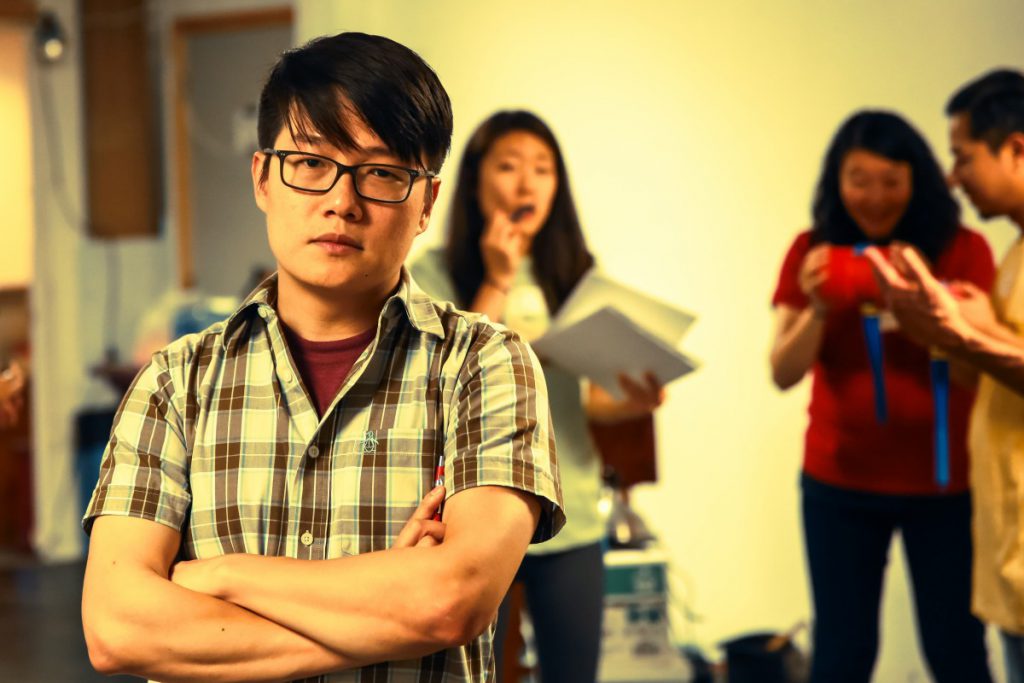story by REERA YOO
photos by DENIS JEONG for GAZILLION VOICES
Middle Brother is a deeply personal work for seasoned Minnesota theater actor Eric Sharp. It follows the story of Billy, a Korean adoptee raised in Waterloo, Iowa, as he relocates to Seoul to live and work in his homeland for the first time in 22 years. After teaching English badly for several months, Billy is just days away from giving up and flying home to the U.S. when he is unexpectedly reunited with his older Korean brother.
Not only does Sharp take on the lead role, but he also penned the play, which is inspired by his own experiences as a Korean adoptee who journeyed back to his mother country in his 20s.
A production of Mu Performing Arts, it marks the playwriting debut of Sharp, who has performed as an actor on prominent stages throughout the Twin Cities, a place renowned for its vibrant theater scene and thriving Korean adoptee community. Middle Brother, named a finalist for the 2013 National New Play Showcase, will be playing at the Southern Theater in Minneapolis from Sept. 12 through Sept. 28.
In a recent email interview with KoreAm, Sharp talked about his experiences as a stage actor, first-time playwright and Korean adoptee.
 Eric Sharp rehearses for the world premiere of ‘Middle Brother’ (Photo by Denis Jeong for Gazillion Voices)
Eric Sharp rehearses for the world premiere of ‘Middle Brother’ (Photo by Denis Jeong for Gazillion Voices)
You’re an adoptee yourself. Is your play solely based on your own personal experiences or is the story mostly dramatized?
The play is based on true events, but has taken on its own theatrical life that has drawn it further and further away from my own story. I’m able to explore the ideas much more fully when I can adjust the circumstances to fit the story I want to tell, versus a more documentary-like account.
You reconnected with your birth family in Korea. What was that experience like?
It has been at once the most emotionally fulfilling and most frustrating experience of my adult life. I have essentially won the lottery twice (I’ve been reunited with both sides of my biological family), and yet that prize has come with conditions and caveats I could have never imagined. I’m thrilled to have rediscovered family members that look like me, but saddened by just how hard it is to keep in touch. They don’t call it a language barrier for nothing.
How did the idea for the play come about?
After I returned from living in Korea, I was really lost for a time. I was, of course, relieved to be back in familiar territory, but also desperately wanted to run away and jump back on another plane to Seoul. So much had happened so quickly, and I was thrown back to the states with no time to process the fact that my family tree had basically exploded all over a map of Seoul. I was looking for a vehicle to tell my friends and family about the fractures that develop when you’re suddenly drawn to a place that’s still so foreign in many ways.
 Eric Sharp rehearses with ‘Middle Brother’ cast. (Photo by Denis Jeong for Gazillion Voices)
Eric Sharp rehearses with ‘Middle Brother’ cast. (Photo by Denis Jeong for Gazillion Voices)
You’re playing the lead role as Billy in your play. Do you ever struggle with getting into character or separating yourself from the role?
The sobering thing about playing a version of myself is that I get the opportunity to really punch the emotional moments in the play that I wish I could have embraced more fully in real life. I’m not trying to craft the play into the plot of a Korean drama, but my story, and the stories of nearly all of my ibyang-ah (adoptee) friends could have been lifted from one. In terms of separating myself from the role, I’m thinking as much about the playwriting right now as I am the acting. My role seems pretty distinct from my life, so I’ve tried not to overthink the Billy/Eric duality. Once again, the play is not a biography, so that’s really not what I’m concentrating on.
You’ve been a theatrical actor in the Twin Cities for a number of years. How do you think your male Korean adoptee identity plays into your career as an actor?
When I was studying theater in college, I really fought my Asian American identity. My stage dialects professor suggested that I study an Asian dialect for our final project, and I bristled at the idea. I was raised by white parents in the center of Iowa, so I naively thought that I’d be treated as such once I graduated and started auditioning for professional roles. My first year out of school was when I began to come to terms with what it means to be an actor of color in the middle of the country. I put away my David Mamet monologues, and picked up plays by Philip Kan Gotanda and David Henry Hwang instead.
When I finally landed in the vibrant Twin Cities theater community, I was completely bowled over when a friend introduced me to Mu Performing Arts—the largest Asian American performing arts company in the Midwest. Not only did I find a company producing plays with people that looked like me in the lead roles, but I was even more surprised to discover that many of the actors were Korean adoptees like myself. I’ve been fortunate enough to work at theaters across the Twin Cities, but Mu is the place where I feel the most at home.
There’s already a number of documentaries and films about Korean adoptees. What differences do you think the stage would bring to the Korean adoptee story compared to it being told on film?
I’ve seen several of the documentaries that have come out of the international Korean adoptee community. I’m always awed by the courage it must take to air such raw emotion and very personal details on the big screen. I think there is clearly a legitimate space for those types of biographical works. As a theater artist, I think I’m looking for a different kind of truth.
Middle Brother is based on my life, but I find real freedom in the knowledge that it is in fact not my life. I still have plenty of stories, opinions, and plot twists and turns from my real-life reunions to which your readers, and the audience members will never be privy. I like having control over the story I want to tell and not vice versa. If all goes well, this non-linear physical theater piece will evoke different, but equally meaningful reactions as if I sat down and recited my experiences verbatim.
How do you think other Korean adoptees will perceive your play?
I have no idea, and don’t care to speculate. That said, I’m writing the piece for them, so I really hope they show up. Luckily, the adoptee community in Minnesota is incredibly strong and organized, so I know the audience is out there.
What was the most difficult part of the production process?
Writing the first draft took more than a full year, and was daunting, to say the least. This is my first play, so I certainly wasn’t versed in “the correct way to write,” if such a thing even exists. It was trying at times when during the workshops and at coffee with friends, the refrain I kept hearing was, “You just need to write the thing.” To which I would always ask, “Yes, but how?” From the beginning I’ve also had the disadvantage of knowing exactly the physical container I wanted the play to live in, without knowing the best ways to get those ideas onto the page. All that said, I think all that hard work was worth it, and I’m really pleased with how the script turned out.
 ‘Middle Brother’ cast: Su-Yoon Ko, Sara Ochs, Audrey Park, Sherwin Resurreccion and Michael Sung-Ho.
‘Middle Brother’ cast: Su-Yoon Ko, Sara Ochs, Audrey Park, Sherwin Resurreccion and Michael Sung-Ho.
(Photo by Denis Jeong for Gazillion Voices)
What do you hope your audience takes away from Middle Brother?
An appreciation for what it means to grow up separated from your flesh and blood by language and thousands of miles.
Do you have any plans releasing Middle Brother outside of Minnesota?
The eventual goal is to tour the play in South Korea. And not as a charity project to raise awareness about international adoption. I hope that is one of the byproducts, but the real reason is that as an actor and playwright, I want to be paid to do something in Korea, besides teaching English. I really suck at teaching English.
‘Middle Brother’ will be playing at the Southern Theater in Minneapolis from Sept. 12-28, 2014. A preview will take place on Thursday, Sept. 11, at 7:30 PM. For more information about the play, visit the Mu Performing Arts website.









